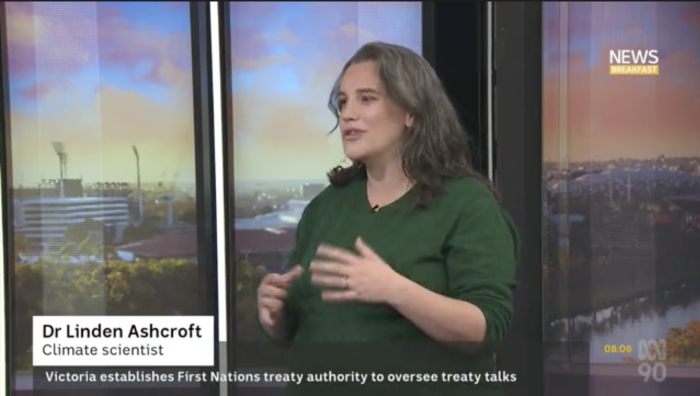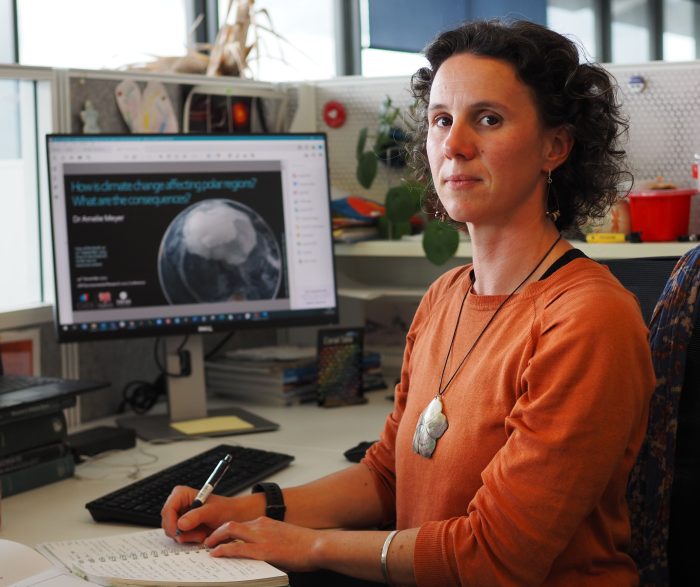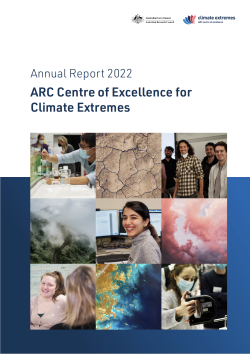
Climate science is a fundamental part of protecting and preparing communities from the extremes of climate change.
Floods, fires, heatwaves, storms, rising oceans – extreme events – need to be understood as part of a bigger picture.
Climate scientists are being asked to provide projections and advice to help governments, industry and decision-makers prepare for the decades to come. We need to be able to look ahead and plan for the future.
The Engagement and Impact team at the ARC Centre of Excellence for Climate Extremes brings together some of Australia’s most talented policymakers, media and communications specialists, science communicators, content makers, designers and more, to ensure that the essential science of climate extremes is heard by the people who need to know.
We train researchers in engagement and impact skills so they can be recognised by decision-makers as:
• Trusted • Respected • Legitimate • Credible • Reputable
Researchers do this by:
- Providing expert comment to international and Australian media.
- Making submissions to government inquiries and processes
- Producing and appearing in web and social media content
- Meeting with decision-makers directly, to educate them about climate science
- Producing resources for school teachers to incorporate climate science.
The Engagement and Impact team provides the training, structure and support that enables Centre researchers to undertake these activities now and well into the future.
How we Connected with the Community and Decision-Makers in 2022
What’s Ahead
2023 – Providing Skills and Support for the Future of Climate Science
To leave a long-term and lasting legacy for the ARC Centre of Excellence for Climate Extremes, the new Engagement and Impact team is focusing on long-term skills and support for researchers in 2023.
Engaging in the policy process
Under the Centre’s new Knowledge Brokerage team lead Angela Kaplish, Centre researchers have been and will continue to submit to Government and industry inquiries – learning about policy processes and translating science for decision-makers. The team will also continue producing the Centre’s highly regarded briefing notes and reports to assist policymakers in understanding the science of climate extremes.
Highlighting early career researchers
New Knowledge Broker Alice Wilson will support early career researchers (ECRs) by highlighting their research on social media and elsewhere online. The Centre will continue to publish a range of written and video profiles of ECRs, teaching them how to be interviewed, promote themselves and prepare for media opportunities as their careers develop.
Long-term media skills and opportunities
The Centre’s new Media and Communications Advisor Jonathan Brown has embarked on an ongoing media training program focused on boosting new voices. The Centre has partnered with the Australian Science Media Centre and Science Media Exchange to provide ongoing media opportunities – often leading to multiple Centre researchers appearing in stories together, providing diverse perspectives on climate science. Fifteen Centre experts provided regular media commentary through the Australian Science Media Centre in 2022, with more being trained in 2023.
Training workshops and one-on-one support
The Engagement and Impact team has delivered training in scientific poster presentations, media training, career development and more. The team has also provided one-on-one support to Centre researchers at all levels, doing everything from assisting senior researchers to prepare for high-level Government consultations, through to holding coaching sessions for students doing their first-ever media appearances. In 2023, the team will build on these training workshops and one-on-one support.
Design, imagery and boosting climate science
The Centre’s new graphic designer Georgina Harmer is assisting researchers in communicating their research through effective design principles. This will be achieved through the development of a range of templates – for posters, Powerpoint presentations and social media as well as for the Centre’s bigger publications, such as the annual report. The team will continue to assist the Centre in communicating scientific concepts through design.
Teaching climate science in schools
The Centre’s highly successful Climate Classrooms program will continue in 2023, led by Dr Sanaa Hobeichi (a former maths teacher and now one of the Centre’s most valued researchers) and the Monash Climate Change Communication Research Hub. The partnership will also host a summit on climate change education and training in 2023.
Engagement and Impact Case Studies

ARC Centre of Excellence for Climate Extremes – Annual Report 2023
From the Chair of the Advisory Board
Climate Science Leaders of the Future
Weather and Climate Interactions Research Program
Attribution and Risk Research Program
Ocean Extremes Research Program
Computational Modelling Systems
Governance, Management and our Commitment to Equity, Diversity and Inclusion


